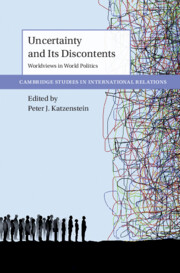116 results
10 - Of Gardens, Forests, and Parks
- from Part IV - Conclusion
-
-
- Book:
- Uncertainty and Its Discontents
- Published online:
- 29 June 2022
- Print publication:
- 07 July 2022, pp 279-352
-
- Chapter
-
- You have access
- Open access
- HTML
- Export citation
Figures
-
- Book:
- Uncertainty and Its Discontents
- Published online:
- 29 June 2022
- Print publication:
- 07 July 2022, pp vii-vii
-
- Chapter
-
- You have access
- Open access
- HTML
- Export citation
Contributors
-
- Book:
- Uncertainty and Its Discontents
- Published online:
- 29 June 2022
- Print publication:
- 07 July 2022, pp viii-viii
-
- Chapter
-
- You have access
- Open access
- HTML
- Export citation
Copyright page
-
- Book:
- Uncertainty and Its Discontents
- Published online:
- 29 June 2022
- Print publication:
- 07 July 2022, pp iv-iv
-
- Chapter
-
- You have access
- Open access
- HTML
- Export citation
Part III - Science and Religion
-
- Book:
- Uncertainty and Its Discontents
- Published online:
- 29 June 2022
- Print publication:
- 07 July 2022, pp 227-276
-
- Chapter
-
- You have access
- Open access
- HTML
- Export citation
Index
-
- Book:
- Uncertainty and Its Discontents
- Published online:
- 29 June 2022
- Print publication:
- 07 July 2022, pp 353-364
-
- Chapter
-
- You have access
- Open access
- HTML
- Export citation
Part II - Accountable Agents and Epistemic Engines
-
- Book:
- Uncertainty and Its Discontents
- Published online:
- 29 June 2022
- Print publication:
- 07 July 2022, pp 177-226
-
- Chapter
-
- You have access
- Open access
- HTML
- Export citation
Preface
-
- Book:
- Uncertainty and Its Discontents
- Published online:
- 29 June 2022
- Print publication:
- 07 July 2022, pp ix-xvi
-
- Chapter
-
- You have access
- Open access
- HTML
- Export citation
Part IV - Conclusion
-
- Book:
- Uncertainty and Its Discontents
- Published online:
- 29 June 2022
- Print publication:
- 07 July 2022, pp 277-352
-
- Chapter
-
- You have access
- Open access
- HTML
- Export citation
1 - Worldviews in World Politics
-
-
- Book:
- Uncertainty and Its Discontents
- Published online:
- 29 June 2022
- Print publication:
- 07 July 2022, pp 1-70
-
- Chapter
-
- You have access
- Open access
- HTML
- Export citation
Part I - Substantialism and Relationalism
-
- Book:
- Uncertainty and Its Discontents
- Published online:
- 29 June 2022
- Print publication:
- 07 July 2022, pp 71-176
-
- Chapter
-
- You have access
- Open access
- HTML
- Export citation
Contents
-
- Book:
- Uncertainty and Its Discontents
- Published online:
- 29 June 2022
- Print publication:
- 07 July 2022, pp v-vi
-
- Chapter
-
- You have access
- Open access
- HTML
- Export citation

Uncertainty and Its Discontents
- Worldviews in World Politics
-
- Published online:
- 29 June 2022
- Print publication:
- 07 July 2022
-
- Book
-
- You have access
- Open access
- Export citation
Protean power: a second look
-
- Journal:
- International Theory / Volume 12 / Issue 3 / November 2020
- Published online by Cambridge University Press:
- 13 August 2020, pp. 481-499
-
- Article
- Export citation
List of Figures and Tables
-
- Book:
- Protean Power
- Published online:
- 28 December 2017
- Print publication:
- 18 January 2018, pp ix-ix
-
- Chapter
-
- You have access
- Open access
- Export citation
Contributors
-
- Book:
- Protean Power
- Published online:
- 28 December 2017
- Print publication:
- 18 January 2018, pp x-x
-
- Chapter
-
- You have access
- Open access
- HTML
- Export citation
Part 4 - Protean Power between Risk and Uncertainty
-
- Book:
- Protean Power
- Published online:
- 28 December 2017
- Print publication:
- 18 January 2018, pp 227-264
-
- Chapter
-
- You have access
- Open access
- HTML
- Export citation
10 - Slumdog versus Superman: Uncertainty, Innovation, and the Circulation of Powerin the Global Film Industry
- from Part 3 - Mixed Worlds: Agility Meets Ability
-
-
- Book:
- Protean Power
- Published online:
- 28 December 2017
- Print publication:
- 18 January 2018, pp 209-226
-
- Chapter
-
- You have access
- Open access
- HTML
- Export citation
Figures and Tables
-
- Book:
- Protean Power
- Published online:
- 28 December 2017
- Print publication:
- 18 January 2018, pp ix-ix
-
- Chapter
-
- You have access
- Open access
- HTML
- Export citation
3 - Protean Power and Revolutions in Rights
- from Part 2 - Protean Power: Embracing Uncertainty
-
- Book:
- Protean Power
- Published online:
- 28 December 2017
- Print publication:
- 18 January 2018, pp 59-78
-
- Chapter
-
- You have access
- Open access
- Export citation



